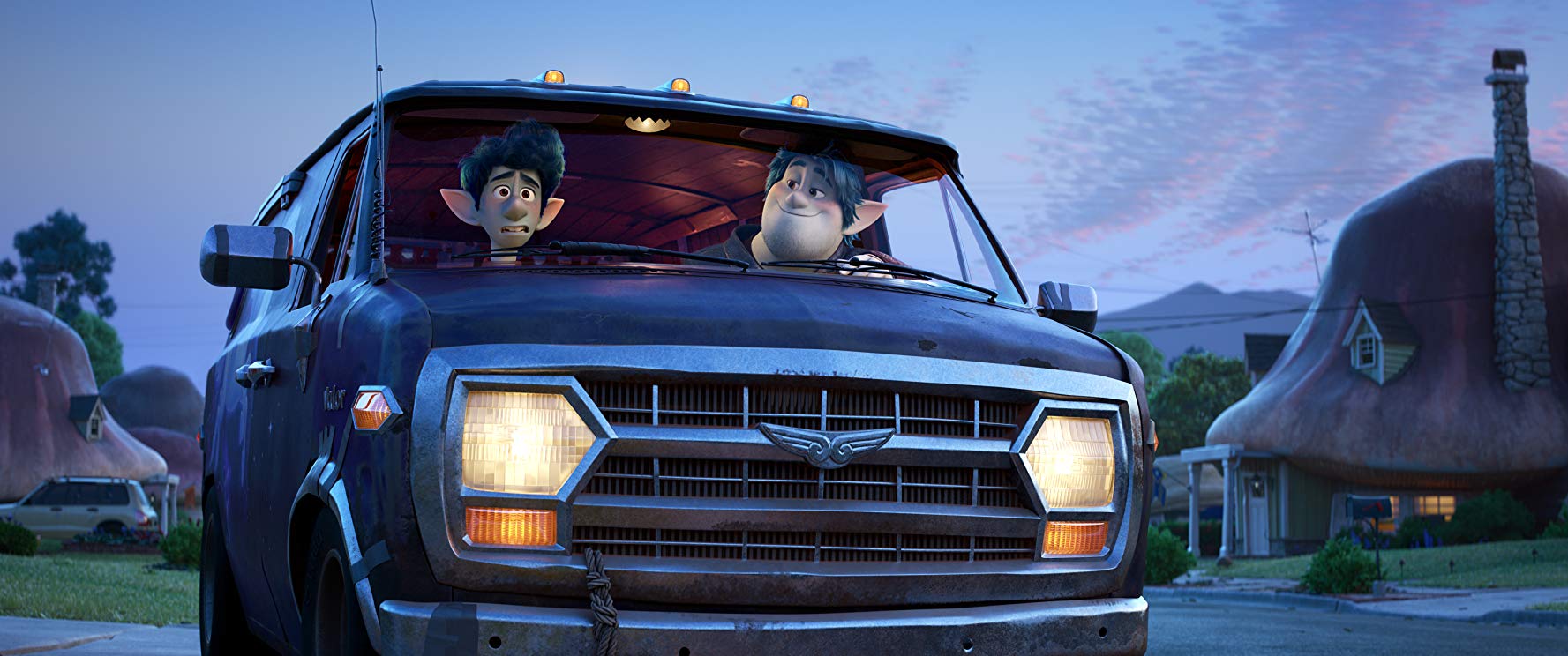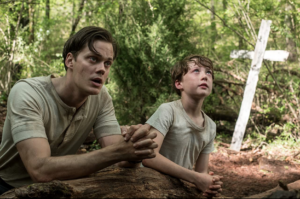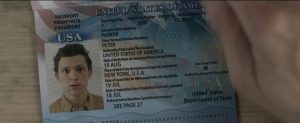Pixar’s new fantasy adventure flick Onward (2020) is surprisingly poignant. “It’s probably the most personal film we’ve ever made at Pixar,” Kelsey Mann, the studio’s Head of Story, said in an interview with the Voice. He should know: Mann led the storyboarding team and coordinated with director Dan Scanlon at every point of the filmmaking process, taking the script and drawing out the visuals that would eventually be animated into the movie. “We’re the first ones to visualize the film,” he said. Mann’s claim that Onward is Pixar’s most personal film is certainly bold, considering the studio’s long history of emotionally resonant filmmaking, but the final product mostly validates the assertion. Though Onward’s story of two brothers trying to bring their father back from the dead has some missteps along the way, it builds to one of the most effective and surprising finales in Pixar’s catalog.
Onward follows Ian (Tom Holland), a nervous teenager on the brink of manhood, and his older brother Barley (Chris Pratt), a goofball with a passion for ancient history. The two of them are elves, one of many magical races living together in a world that envisions the fantasy stylings of Dungeons and Dragons if they had decayed into realistic suburban banality. For Ian’s 16th birthday, his mother (Julia Louis-Dreyfus) gives him a magic staff, a delayed gift from his father, who died before he was born. The staff comes with a spell, specially designed to bring his father back from the dead for one day, so he can meet his two adult children. Unfortunately, Ian is no grandmaster wizard and only manages to resurrect his father’s legs, so he and Barley set off on a quest to find a phoenix gem to finish the spell, spend a day with their dad, and maybe bring a little more magic into the world.
The quest itself, sadly, isn’t particularly interesting. The bulk of Onward’s runtime is filled by an episodic road trip, where the brothers arrive at a location, have a rote encounter with some form of adversity, then escape and move on after learning a standard coming-of-age lesson. These scenarios aren’t boring, and there are a few hilarious jokes and effective moments of tension sprinkled throughout, but overall they lack the inventive spark of Pixar’s most memorable films.
The straightforwardness of the main action, however, allows the eye to wander and appreciate the creativity of all the references and Easter eggs hidden in the background of many scenes. While the classic Pixar staples like the Luxo ball and A113 are present, they aren’t as prominent as other visual jokes or allusions to fantasy stories. According to Mann, this is deliberate. He was instrumental in creating many of the Easter eggs in Onward, assembling a team to decide early on how they would be incorporated into the movie. “We wanted to make them not too hard to find but you had to work for them a little bit,” he said. The results of this strategy are excellent, creatively playing with the high fantasy tropes of the film to create a whole new level of enjoyment for the audience.
The other aspects that enliven an otherwise generic plot are the characters. Early in the film, Julia Louis-Dreyfus’ suburban mom teams up with The Manticore (Octavia Spencer), a kitschy restaurant owner who used to be a fearsome monster. The interplay between the two is delightful, as they mutually deal with each other’s eccentricities and accept their roles as warriors. The other woman of note is Officer Specter (Lena Waithe), Pixar’s first openly lesbian character. According to Mann, in early versions of the script, she was not only straight but also a man before being changed to diversify the film. As Mann puts it, “We’re telling a fantasy film through a modern world and we want to make sure that modern world represents our own world which is a diverse world.” The role is relatively minor, and there has been some criticism over Officer Specter’s one-eyed, purple-skinned, orcish appearance (it should be noted that most characters in Onward are pretty weird looking and have limited screen time), but it’s still a step forward for both Pixar and parent company Disney. Officer Specter has a name, lines, a tangible effect on the plot, and no patronizing “gay moment,” which is much more than can be said for a lot of LGBTQ+ representation.
The side characters’ most important role, however, is to support the true stars of Onward, Ian and Barley. The interactions between these two are what keep the film moving even through its lackluster midsection. The ways they support each other, argue, commiserate over shared circumstances, and work together to complete their quest suggest a fully realized brotherly bond and all the complexity that entails. Ian and Barley’s relationship adds weight and depth to even the least interesting scenes in Onward and becomes the core of the story during the film’s action-packed climax. The finale of Onward is wonderful, subverting expectations just enough to surprise the audience while still paying off the film’s entire build-up. It’s an incredible sequence, exploring family dynamics in a new way and providing the tear-jerking conclusion that Pixar fans have come to expect. Holland and Pratt’s voice work contributes immeasurably to this scene’s success. The two are perfectly cast in their roles, both embodying their characters so well that it often seems like Ian and Barley were written to match their actor’s personalities.
The real template for Ian and Barley, however, is much more interesting and speaks to Mann’s assertion that this is Pixar’s most personal film. One of the main inspirations for Ian and Barley, and for the plot of Onward as a whole, is director Dan Scanlon’s own life experience. “Dan thought about his own life and what shaped him and made Dan Dan. And he thought about never meeting his father, he never knew him, he was six months old when his dad died,” Mann said. “He thought, ‘Oh, it would be really great if a character had an experience like me but had an opportunity to spend one day with that person that they lost.’” With that knowledge, Onward can be viewed in an entirely new light. Ian and Barley are, roughly, Dan Scanlon and his older brother Bill. The trials that they face and the emotions they feel aren’t the conjurations of some screenwriter’s imagination. They are the lived experience of a man portraying his life through art. Onward may not be Pixar’s best movie, but it is certainly a film deeply connected to the soul of its creator.




